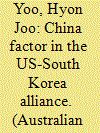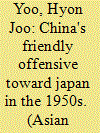| Srl | Item |
| 1 |
ID:
127354


|
|
|
|
|
| Publication |
2014.
|
| Summary/Abstract |
Over the past 10 years, South Korea has chosen inconsistent strategies with respect to the US-South Korea alliance. On the one hand, Seoul disagreed with Washington about the extended role of United States Forces Korea and the deployment of US missile defence systems in East Asia. On the other hand, these problems ironically coincided with South Korea's strong support for the USA in operations in Afghanistan and Iraq. What explains the inconsistency of South Korea's alliance policies? Major schools of thought in international relations have offered explanations, but their analyses are deficient and indeterminate. This article looks at the South Korea-China-North Korea triangle as a new approach to explaining the puzzling behaviour of South Korea. The model shows that South Korea's alliance policies are driven by two causal variables. First, North Korea is an impelling force for South Korea to remain as a strong US alliance partner. This encourages Seoul to maintain cooperation with Washington in wide-ranging alliance tasks. Second, South Korea's policies are likely to reflect the way the nation perceives how useful China is in taming North Korea. The perceived usefulness of China causes Seoul to accommodate China and decrease cooperation with the USA. This might strain the relationship with the USA should South Korea evade alliance missions that might run contrary to China's security interests.
|
|
|
|
|
|
|
|
|
|
|
|
|
|
|
|
| 2 |
ID:
137183


|
|
|
|
|
| Summary/Abstract |
This article explores why the People's Republic of China employed a surprisingly soft and lenient policy toward Japan in the 1950s despite their historical and political animosities. Relying on a relatively new concept in the study of international relations, I argue that China's conciliatory policy toward Japan represented a wedge strategy that was designed to detach Japan from the United States and weaken the US-Japan alliance. The logic of the theory also reveals that China's policy was in line with its “united front” against the United States during the Cold War.
|
|
|
|
|
|
|
|
|
|
|
|
|
|
|
|
| 3 |
ID:
113185


|
|
|
|
|
| Publication |
2012.
|
| Summary/Abstract |
Since the 1990s, Japan and the Republic of Korea have chosen dissimilar policy options with respect to the US-led missile defense (MD) systems in East Asia. What explains the two countries' dissimilar MD strategies? Inspired by neoclassical realism, this study introduces a framework of domestic hurdles that combines Randall Schweller's cohesion model and Jeffry Taliaferro's resource extraction model. It sheds light on the degree of elite cohesion and social and economic impediments as key causal determinants that impede balancing against external threats. Although the influence of systemic variables that suppose optimal policy options, such as balancing, domestic hurdles impede or delay such options. This study will provide useful contributions to international relations by offering comparative and theoretical analyses on different paths that Tokyo and Seoul have chosen for their MD policies.
|
|
|
|
|
|
|
|
|
|
|
|
|
|
|
|
| 4 |
ID:
186610


|
|
|
|
|
| Summary/Abstract |
This article focuses on the varying intensity of political clash that South Korea has got involved in with Japan regarding the territorial dispute, Dokdo/Takeshima. Existing works are limited to acknowledging the role of nationalism as a key obstacle to the negotiation or settlement of the territorial dispute. However, democratically elected Korean leaders at times remained low key in the territorial problem and even sought collaboration with Japan despite the existence of nationalism. Specifically, South Korea employed both calm and hardline diplomatic choices in the territorial dispute. Why did South Korea choose disparate territorial policies despite the population’s anti-Japanese sentiments? Under what circumstances did leaders in Korea employ dovish diplomacy that might cause a strong backlash from the public? Introducing the vulnerability-restraint theory, I argue that top decision makers’ political vulnerability in domestic politics and the restraining pressure from the United States have impact on the final choice of foreign policy.
|
|
|
|
|
|
|
|
|
|
|
|
|
|
|
|